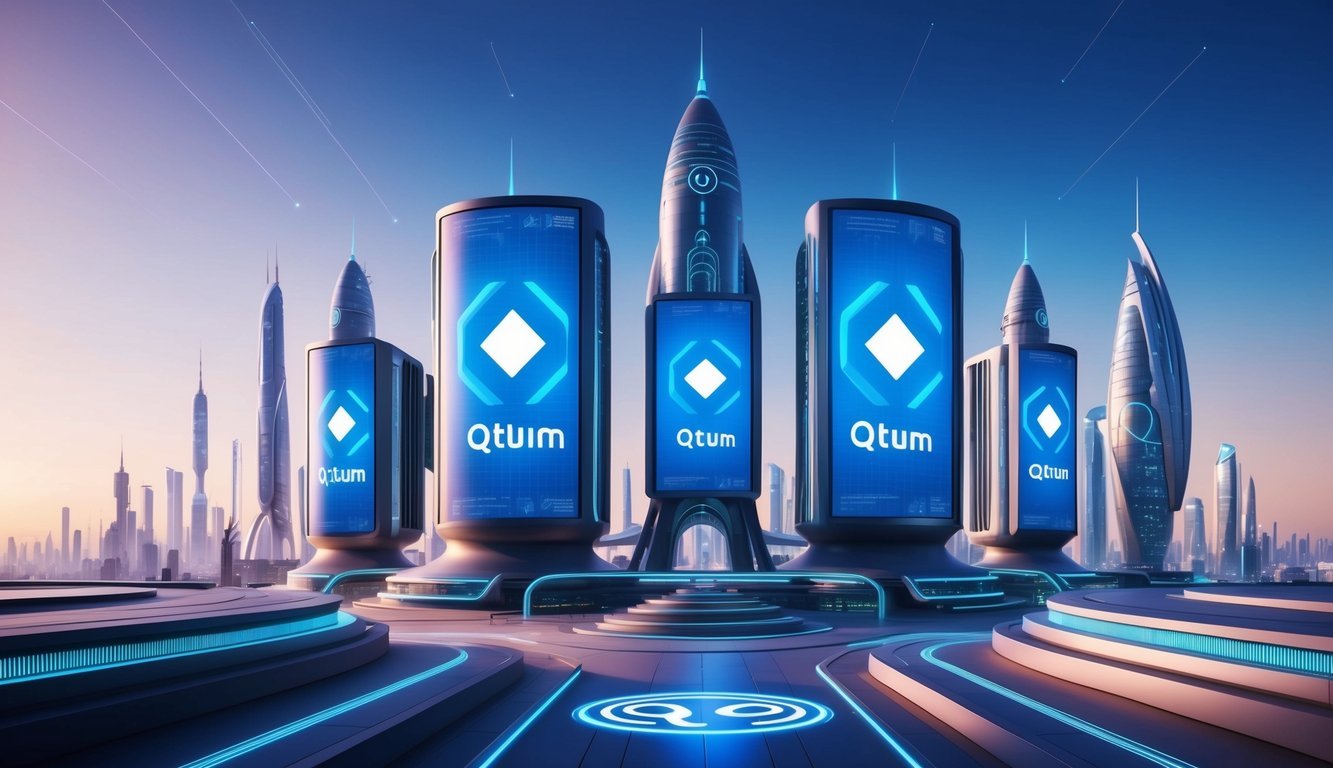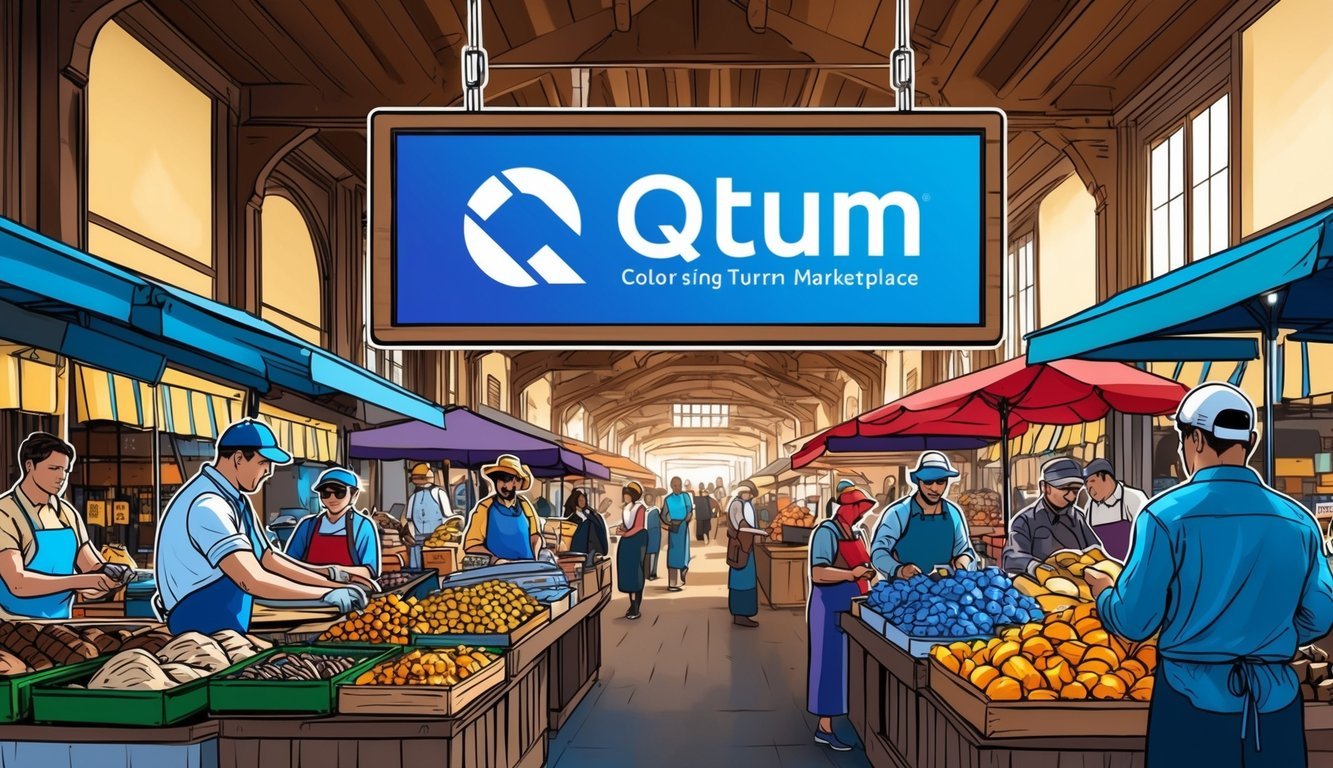Qtum is a unique cryptocurrency that blends features from Bitcoin and Ethereum. It aims to make blockchain technology more accessible for businesses and developers.
Qtum uses a special system that allows it to run smart contracts while keeping the security of Bitcoin’s network.

You might wonder why Qtum matters in the crowded world of cryptocurrencies. It stands out by offering a platform that’s both stable and flexible. This makes it easier for companies to build apps on the blockchain without worrying about technical issues.
Qtum isn’t just another digital coin. It’s a tool that could change how businesses use blockchain. By combining different technologies, Qtum creates new possibilities for apps and services that can benefit from decentralized systems.
Key Takeaways
- Qtum combines Bitcoin’s security with Ethereum’s smart contract abilities
- It makes blockchain easier for businesses to use and build on
- Qtum could spark new types of decentralized apps and services
Understanding Qtum’s Technology
Qtum combines key features from Bitcoin and Ethereum to create a unique blockchain platform. Its design aims to make smart contracts more secure and easier to use for businesses.
Account Abstraction Layer (AAL)
The Account Abstraction Layer is a key part of Qtum’s tech. It acts like a bridge between different parts of the system. The AAL lets Qtum use both Bitcoin’s UTXO model and Ethereum’s smart contracts.
This layer makes it easier for developers to build apps on Qtum. You don’t need to know all the complex details of how the blockchain works. The AAL handles that for you.
It also adds extra security. By separating different parts of the system, it’s harder for hackers to attack.
UTXO Model and Smart Contracts Integration
Qtum uses Bitcoin’s UTXO model for handling transactions. This model is known for being secure and stable. But Qtum takes it a step further by adding smart contracts on top.
This combo gives you the best of both worlds. You get the security of Bitcoin with the flexibility of Ethereum-style smart contracts.
Here’s what this means for you:
- More secure transactions
- Ability to run complex smart contracts
- Better scalability for your apps
Proof of Stake Consensus
Qtum uses a Proof of Stake system to verify transactions. This is different from Bitcoin’s energy-hungry Proof of Work.
With Proof of Stake, you can earn rewards by holding and “staking” QTUM coins. The more coins you stake, the more likely you are to be chosen to validate blocks and earn rewards.
This system has some big benefits:
- Uses way less energy than Proof of Work
- Faster transaction times
- More people can take part in securing the network
You don’t need expensive mining hardware. Just a computer and some QTUM coins are enough to start staking.
Qtum’s Place in the Market

Qtum has carved out its own spot in the crypto world. Let’s look at how it stacks up in terms of market value, supply, and trading activity. We’ll also see how it compares to big names like Bitcoin and Ethereum.
Market Capitalization and Price
Qtum’s market cap puts it in the mid-range of cryptocurrencies. As of August 2022, it ranked 98th by overall market cap. The price of QTUM has seen ups and downs since its launch.
At its peak in January 2018, QTUM hit an all-time high of $112.32. But crypto markets can be tough. In March 2020, it dropped to its lowest point of $0.75.
More recently, QTUM has been trading around $2.41. Keep in mind that prices can change fast in crypto, so always check the latest data before making any moves.
Circulating Supply and Volume
The number of QTUM coins out there affects its market position. Currently, there are about 105 million QTUM in circulation.
Trading volume is another key factor. It shows how much QTUM is changing hands each day. Lately, the 24-hour trading volume has been around $38.64 million.
This mix of supply and trading activity helps shape QTUM’s market presence. Higher volume often means more interest from traders and investors.
Comparisons with Bitcoin and Ethereum
Qtum takes ideas from both Bitcoin and Ethereum. It uses Bitcoin’s UTXO model for transactions but adds Ethereum’s smart contract abilities.
Unlike Bitcoin, Qtum uses proof-of-stake for consensus. This can make it more energy-efficient than Bitcoin’s proof-of-work system.
Compared to Ethereum, Qtum offers a different approach to smart contracts. It aims to be more business-friendly while keeping the flexibility that developers like about Ethereum.
In terms of market size, both Bitcoin and Ethereum are much larger than Qtum. But Qtum’s unique mix of features gives it its own niche in the crypto ecosystem.
Investing in Qtum
Qtum offers several ways to get involved financially. You can buy and trade QTUM tokens, earn rewards through staking, or gain exposure through ETFs.
How to Buy Qtum
You can buy QTUM tokens on many popular cryptocurrency exchanges. First, set up an account on an exchange that lists QTUM. Some options include Binance, Huobi, and OKEx.
Next, fund your account with fiat currency or another cryptocurrency. Navigate to the QTUM trading pair and place a market or limit order to buy tokens.
After purchasing, it’s best to move your QTUM to a personal wallet for security. Qtum has an official wallet app for desktop and mobile devices.
Staking Qtum
Staking lets you earn rewards by helping secure the Qtum network. To stake, you need to hold QTUM in a compatible wallet.
The Qtum Core Wallet is the main option for staking. Once set up, you can start staking with as little as 1 QTUM.
Rewards are paid out roughly every 16 minutes. The more QTUM you stake, the higher your chances of earning rewards.
Qtum Holdings in the Defiance Quantum ETF
The Defiance Quantum ETF (QTUM) offers exposure to quantum computing and other next-gen technologies. Despite its ticker, it doesn’t hold QTUM cryptocurrency.
Instead, it invests in companies working on quantum computing, AI, and machine learning. Top holdings include NVIDIA, Microsoft, and IBM.
This ETF gives you indirect exposure to the potential of quantum tech without directly buying crypto. It’s traded on stock exchanges like a normal ETF.
Future Prospects and Adoption
Qtum aims to shake up the blockchain world. It’s got big plans for decentralized apps, wider use, and even AI. Let’s take a peek at what’s coming down the pike for this platform.
Decentralized Applications Built on Qtum
Qtum’s making waves with its decentralized apps. You can expect to see more cool stuff popping up soon. Developers love Qtum because it’s flexible and easy to use.
Some apps in the works:
- Smart contract-powered gaming
- Decentralized finance tools
- Supply chain management systems
These apps could change how you do business and have fun online. Qtum’s low fees make it a hit with app creators too. They can build without breaking the bank.
Potential for Widespread Adoption
Qtum’s not just for tech geeks. It’s aiming for the big leagues. You might see it pop up in:
- Business solutions
- Government projects
- Everyday tech you use
The Qtum-Ethereum bridge is a game-changer. It’ll let you use popular coins like USDC on Qtum. This could bring in more users and make Qtum a go-to platform.
Qtum’s also working on making its wallet super easy to use. You won’t need to be a tech whiz to get started.
Qtum AI Initiatives
Qtum’s not sitting on its hands when it comes to AI. They’re jumping in with both feet. You might see:
- AI-powered prediction markets
- Smart contracts that learn and adapt
- Automated trading systems
These AI tools could make Qtum even smarter and more useful. The Defiance Quantum ETF shows there’s buzz around quantum tech in finance. Qtum’s mix of blockchain and AI could ride this wave.
Qtum’s also looking at ways AI can make the network faster and more secure.
Frequently Asked Questions

Qtum aims to blend Bitcoin’s security with Ethereum’s flexibility. It uses a unique proof-of-stake system and focuses on business applications. By combining these elements, Qtum also allows for seamless interactions between smart contracts and blockchain applications. In addition, it is essential to consider the broader ecosystem, including a polkadot blockchain network overview, which highlights how different blockchain platforms can interoperate and enhance each other’s functionalities. This interoperability may allow Qtum to leverage cross-chain capabilities and connect with a wider range of decentralized applications.
What’s the purpose of Qtum in the crypto space?
Qtum tries to combine Bitcoin’s security with Ethereum’s smart contracts. It wants to be a safe and flexible platform for businesses to use blockchain tech.
The project aims to make it easier for companies to adopt blockchain. Qtum offers tools for creating decentralized apps and smart contracts.
How does the Qtum coin operate?
QTUM uses a proof-of-stake consensus model. This means you can earn more QTUM by holding and “staking” your coins.
The system rewards users who help keep the network secure. You don’t need special hardware to participate, unlike Bitcoin mining.
Any predictions on where Qtum prices are headed?
Crypto prices are hard to predict. Qtum’s price can be very volatile, changing by 4% or more in a day.
It’s best to do your own research before investing. Look at Qtum’s tech, adoption, and overall market trends.
What’s the deal with mining Qtum?
You don’t actually mine Qtum. Instead, you can stake your coins to earn rewards.
Staking is like earning interest on your QTUM. You keep your wallet online to help validate transactions and secure the network.
How’s Qtum stacking up as an investment option?
Qtum aims to be useful for businesses and real-world applications. This could make it attractive to investors interested in practical blockchain use.
Remember, all crypto investments carry risks. It’s smart to only invest what you can afford to lose.
Who’s the brain behind Qtum?
A team of blockchain experts created Qtum. Key figures include Patrick Dai, Jordan Earls, and Neil Mahi.
These founders have backgrounds in blockchain tech and business. They aimed to create a platform that’s both secure and flexible for real-world use.





